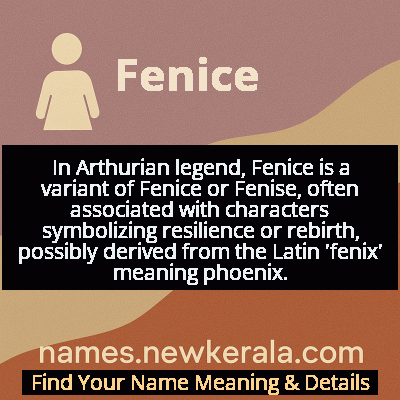Fenice Name Meaning & Details
Origin, Popularity, Numerology Analysis & Name Meaning of Fenice
Discover the origin, meaning, and cultural significance of the name FENICE. Delve into its historical roots and explore the lasting impact it has had on communities and traditions.
Name
Fenice
Gender
Female
Origin
Arthurian
Lucky Number
6
Meaning of the Name - Fenice
In Arthurian legend, Fenice is a variant of Fenice or Fenise, often associated with characters symbolizing resilience or rebirth, possibly derived from the Latin 'fenix' meaning phoenix.
Fenice - Complete Numerology Analysis
Your Numerology Number
Based on Pythagorean Numerology System
Ruling Planet
Venus
Positive Nature
Harmonious, responsible, caring, and artistic.
Negative Traits
Overly idealistic, superficial, possessive, or jealous.
Lucky Colours
Pink, turquoise.
Lucky Days
Friday.
Lucky Stones
Diamond, turquoise.
Harmony Numbers
2, 3, 9.
Best Suited Professions
Artists, musicians, teachers, healthcare workers.
What People Like About You
Warmth, nurturing nature, artistic flair.
Famous People Named Fenice
Fenice (Literary Character)
Arthurian Romance Character
Central female protagonist in Chrétien de Troyes' 'Cligès' known for her clever deception to be with her true love
Fenice (Operatic Character)
Opera Character
Featured in various operatic adaptations of Arthurian legends, representing idealized medieval femininity
Fenice (Modern Literary Reference)
Literary Inspiration
Inspiration for characters in modern fantasy novels exploring Arthurian themes and strong female protagonists
Name Variations & International Equivalents
Click on blue names to explore their detailed meanings. Gray names with will be available soon.
Cultural & Historical Significance
Extended Personality Analysis
The personality traits associated with Fenice reflect both her literary heritage and the symbolic meanings attached to the name. Typically, Fenices are characterized by a remarkable blend of romantic passion and practical intelligence. They tend to be deeply feeling individuals who nevertheless approach emotional challenges with strategic thinking and careful planning. This combination makes them both idealistic and effective—they dream big but possess the organizational skills to make those dreams reality. There's often a theatrical quality to their personalities; they understand the power of appearance and performance in achieving their goals, much like their namesake who staged an elaborate false death. Yet this theatricality serves genuine emotional depth rather than superficiality. Fenices usually exhibit strong loyalty to chosen relationships and causes, combined with the courage to defy convention when necessary. They're often drawn to creative fields or intellectual pursuits where their combination of emotional intelligence and analytical thinking can flourish. Their resilience in the face of adversity is particularly notable—they have the phoenix-like ability to transform setbacks into opportunities for growth and reinvention.
Modern Usage & Popularity
In contemporary naming practices, Fenice remains an exceptionally rare choice, typically selected by parents with specific literary, historical, or mythological interests. Its modern usage reflects several current naming trends: the popularity of unique mythological names, the revival of Arthurian names, and the growing preference for names with strong female associations. While statistically insignificant in most national naming databases, Fenice has gained visibility through online naming communities and fantasy literature fandoms. The name appeals particularly to parents seeking names that are both feminine and strong, with intellectual and literary credentials. Its usage is slightly more common in Europe, especially Italy where 'fenice' is the actual word for phoenix, though even there it maintains an air of distinctive elegance. Modern bearers often report that the name sparks conversations about its origins, allowing them to share the rich Arthurian and mythological background. The name's rarity ensures that those who carry it stand out, while its literary and symbolic depth provides meaningful substance behind its unusual sound.
Symbolic & Spiritual Meanings
Symbolically, Fenice operates on multiple levels that enrich its meaning beyond conventional name symbolism. Most directly, it evokes the phoenix—the mythical bird that cyclically regenerates through fire, representing themes of resurrection, immortality, and transformational renewal. This connects powerfully to the Arthurian character's story of apparent death and rebirth for love. The name also symbolizes the tension between appearance and reality, as Fenice's narrative explores the gap between social expectations and authentic desire. In psychological terms, it represents the integration of seemingly opposite qualities: passion and reason, tradition and innovation, loyalty and independence. The symbolic resonance extends to alchemical themes of transformation—the process of turning base experiences into golden wisdom. For modern bearers, the name often comes to symbolize personal reinvention and the courage to pursue authentic happiness against conventional wisdom. It carries echoes of the heroic journey archetype, particularly the 'return' phase where the hero brings hard-won wisdom back to transform their world. These layered symbolic meanings make Fenice particularly resonant for individuals and families who value depth, transformation, and the integration of ancient wisdom with modern life.

